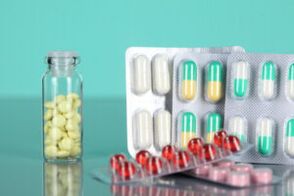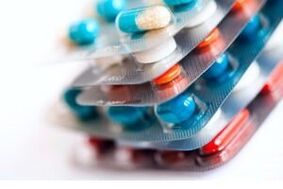Often, in the early stages, doctors prescribe medication when prostatitis is diagnosed as an inflammatory process in the prostate gland in men. In fact, the therapy is very laborious and time consuming. Prescription of drugs is carried out only by a specialist on the basis of symptoms and diagnostic indicators.
How to tell if the prostate is inflamed?
Inflammation of the prostate gland develops rapidly, and when the unpleasant symptoms appear, you can understand the disease:

- decreased sexual intercourse;
- rapid onset of ejaculation;
- a feeling of constant satiety in the bladder;
- and discomfort during bowel movements, painful sensations in the perineum;
- onset of uncontrolled slow erection;
- urination in a thin intermediate stream;
- unexplained persistent fatigue;
- increase in temperature to 41 degrees with the addition of bacteria.
It is important to determine the form of the disease before starting treatment. For example, in the event of stagnation and damage by harmful bacteria, treatment is primarily with antibiotics to suppress the harmful microflora. The main thing for prostatitis is to choose the most effective medication.
Medications, release forms
Drug treatment of prostatitis involves many drugs with different forms of release. However, it is important to understand that one form or another is determined by the stage, form, type of development, existing symptoms, and contraindications.
Used among all known drug groups:
- solutions for the appointment of microclusters to suppress the inflammatory process;
- tablets, especially antibiotics, as a kind of drug in the treatment of inflammation of the prostate gland;
- rectal suppository directly affecting the affected lesions;
- Injections in injections as a form of medication that has a rapid effect to suppress the inflammatory process in prostatitis.
Many men suffer from mental and nervous system disorders that require recovery. Erection deteriorates sharply and strength is greatly reduced, prostatitis coming as a blow from below the waist for stronger sex. Men begin to feel stressed, and problems arise in the personal sphere.
Tranquilizers or antihistamines will come to the rescue to relieve swelling and inflammation, but dosages and courses of treatment should not be neglected to avoid side effects and a sharp worsening of the condition. In addition, many men are wondering how to treat prostatitis with drugs and what is better to take: pills or suppositories? The use of suppositories covers a place close to the prostate gland. However, the suppository is safer, does not affect the stomach, dissolves quickly in the rectum, and is directed to the site of injury by blood flow. The effect comes after 20 minutes.
If you no longer have the strength to endure the pain, the problem with pills can be overcome, although the funds enter the stomach and cause the liver to break down when it loses the effect of many nutrients. The tablets act after 40-45 minutes, much later. For this reason, it is best to choose rectal suppositories for the treatment and prevention of prostatitis and prostate adenoma.
Prescribed medications
It is important to direct medication to suppress the source of the inflammation.
Medications are prescribed by only one specialist, taking into account the characteristics of the inflammatory process, the type of disease, the degree and stage of development of prostatitis:

- When pathogenic bacteria are detected, antibiotics are prescribed, the acute course of the disease is a 6-week course of therapy - 2 months.
- Macrolides in the chronic course of the disease.
- Non-steroidal anti-inflammatory drugs that directly affect the source of inflammation.
- Decongestants, painkillers for excessive swelling of the prostate, painful urination.
- Hormonal agents with a decrease in erectile function to restore and normalize the endocrine system.
- Adrenergic blockers for urinary problems to normalize urine flow, relieve inflammation and pain during urination.
- Rectal suppositories that aim to act directly on the source of inflammation to suppress adverse processes. These are the safest drugs that do not reduce the function of the liver and kidneys, but work perfectly with harmful microbes. Dairy products are an excellent addition to antibiotics in case of weakened immunity to suppress harmful microflora when strong antibiotics also kill the beneficial flora in the body. Dinner tables are considered safer and more effective.
- Immunomodulators to enhance local immunity.
- Muscle relaxant to relieve pain, normalize blood flow in the prostate gland, completely relax the flow.
- Urinary incontinence, painkillers for severe pain in the form of injections, tablets release.
- Sedatives to restore the nervous system, eliminate excessive anxiety, calm down. In many men, prostatitis clearly affects the psyche and does not affect the nervous system at best.
- Tranquilizers for obvious mental disorders to increase potency, normalize blood circulation and urinary excretion.
- Decongestant antihistamines to reduce swelling of the prostate tissue.

Note! Some tranquilizers are addictive, so dose and timing violations are not recommended. According to doctors, it is better to use a liquid drug that has a rapid effect on the source of pain. Suppositories can be used as enemas when the composition enters the urethra and quickly relieves pain.
Only complex treatment will be more effective and recovery will be faster. In addition, the behavior of a course of physiotherapy and taking folk remedies at home will no longer be. It should be understood that if you do not start treatment on time, the disease will soon turn into a chronic stage. If you do not have an erection in the morning, obvious signs of a potential violation, pain in the abdomen, you should immediately consult a urologist. Without knowledge, you should not prescribe medication for prostatitis independently with unknown drugs, you should resort to lethal doses for faster recovery. Thus, there will be no relief, but other health problems and serious complications will occur.
It is important! Improper treatment can lead to serious consequences: adenoma, prostate cancer, chronic disease
Which is more appropriate: anti-inflammatory or antibiotic drugs?

- If prostatitis is detected in an acute course, the use of antibiotics from the group of fluoroquinolones is recommended.
- If the prostatitis has a chronic course, it is better to take macrolides or tetracycline antibiotics.
- If non-bacterial prostatitis is detected, antibiotic treatment may simply be ineffective. It is best to take anti-inflammatory drugs from the NSAID group.
Attention! It is recommended to take short-term courses with a 1-week break when taking NSAIDs
Which is better: suppositories or pain pills?
Rectal suppositories do not interact with the digestive system, liver, or kidneys, so they are considered safer and used to regulate prostatitis treatment, relieve inflammation, pain and swelling, and normalize urinary excretion.
The use of pain medications is recommended when there is severe pain, although uncontrolled use of analgesics can cause side effects and complications.
If there is pain in the perineal area, it is better to take a muscle relaxant to reduce the muscle tone in the groin. Best used in rectal suppositories, non-steroids will help relieve swelling and pain. The best medicines are natural herbal products based on herbs.
It is important to understand that if the inflammation of the prostate gland is caused by bacteria, it is better to treat with antibiotics, but ignore the dose and duration of treatment. To treat prostatitis means to forget about the inflammatory process and blockage forever, to strictly follow all the recommendations of specialists, to use medications on time and under instructions.





































